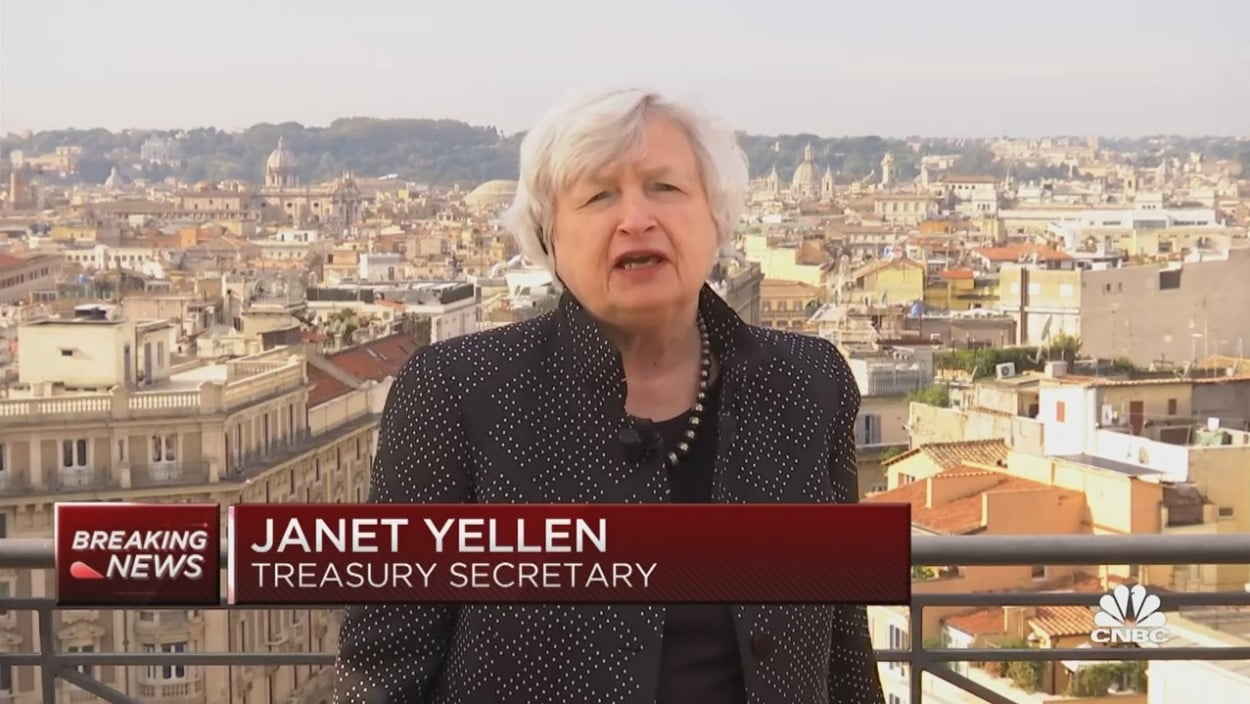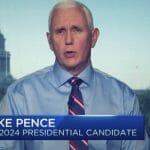Following is the unofficial transcript of a CNBC interview with United States Treasury Secretary Janet Yellen and CNBC’s Sara Eisen on “Worldwide Exchange” (M-F, 5AM-6AM ET) today, Friday, October 29th. Following is a link to video on CNBC.com:
Q3 2021 hedge fund letters, conferences and more
Treasury Secretary Janet Yellen On Inflation, Biden Agenda, And The Supply Chain Crisis
SARA EISEN: Good morning, Courtney. And good morning to the Treasury secretary, Janet Yellen, who is joining us this morning from Rome at G20. It's great to see you. Wish I could be there on the rooftop.
JANET YELLEN: Thanks so much, Sara.
SARA EISEN: So, so, Secretary Yellen—
JANET YELLEN: Thanks so much, Sara.
SARA EISEN: You're welcome. I just wanted to start obviously with the plan that you call transformational, the, the framework that President Biden announced yesterday. House leaders scrapped a vote last night. President Biden arrived in Rome heading toward G20, heading toward COP26. How big of a blow is it that he comes empty handed?
JANET YELLEN: Well, I believe that pretty soon hopefully next week, Congress will pass both the reconciliation or Build Back Better bill and also the infrastructure package. There seems to be strong support for it in both houses of Congress. As I say, it's transformational. And I believe these will become, become law. And they contain so many, so many programs that will be so important for the American people. Two additional years of early childhood education that will be universal. Remarkable support that will make childcare affordable, help women participate in the labor market. Historic investments in health care for seniors, for the elderly, for those who are disabled. Support that will make health care affordable. And of course, an historic investment in climate change, which is really an existential threat. And the infrastructure package, you know, not only has investments in roads and bridges but what we need to have a modern, efficient society: broadband, ports, modern transport that's efficient and climate friendly investment in research and development and climate change, the grid.
SARA EISEN: You, you have said that this, these plans will add to growth and be stimulative for the economy. Any sense of how much and for how long?
JANET YELLEN: Well, I think that it really helps us invest in physical capital that's public infrastructure that's important to productivity growth. There's investment in people or human capital. There's investment in research and development. And the supports that families will receive that will help them participate in the labor market that'll, that will boost labor supply. All of those things boost the economy's potential to grow to, to my mind, certainly over the long run, over a decade, several tenths of a percentage point.
SARA EISEN: Will it drive up short-term inflation even more?
JANET YELLEN: No, I don't think that these investments will drive up inflation at all. First of all, they're fully paid for. They're and not by imposing higher taxes on anyone earning under $400,000 but by asking corporations, high-income individuals to pay their fair share, and by investing in the Internal Revenue Service so that they can boost compliance, which has fallen to low levels. We have a huge amount of uncollected tax revenue, a tax gap that's estimated at $7 trillion over a decade. And the spending that's involved, it, it occurs slowly over the course of a decade so unlike the American Rescue Plan which was attempting to address the impact from the pandemic and involved a lot of spending in a short time, the infrastructure and Build Back Better packages are spending that's really small relative to the economy in any year and spread over ten years and as I said, it will boost the economy's potential to grow, the economy's supply potential, which tends to push inflation down, not up. And, you know, for many American families experiencing inflation, seeing the prices of gas and other things that they buy rise. What this package will do is lower some of the most important costs: what they pay for health care, for childcare and it's anti-inflationary in that sense as well.
SARA EISEN: You mentioned the pay-fors, and I did, did want to ask you about that because it, it looks like you didn't get the billionaires' unrealized gains tax, which was somewhat controversial and unprecedented. Didn't do the elimination of stepped-up basis. And really avoided the whole tax avoidance by the wealthy in terms of their investments, which is something that I know you were hopeful for and that you promised to do. So, was that a disappointment?
JANET YELLEN: Well, we, we proposed what we thought are good and appropriate tax policies. We do need to be able to muster the votes to get these bills through the House and through the Senate. And we tried to design a package of revenue raisers that would be acceptable to members of Congress. So, we pared back on some rate increases that weren't acceptable to members of the Senate. And I think the, the raisers that we have though are appropriate, fair. And while there isn't a mark-to-market billionaires tax I think it's been agreed that in, in individuals earning high incomes, more than $5 or $10 million will pay a surtax on their income tax rates and that hits really high-income individuals.
SARA EISEN: Sure. And on the corporate front, I know part of this is, is what you're there to do in Rome, in G20, in this, this framework for the, the global minimum tax for corporations, something you've worked hard on. You've gotten a ton of agreement, 140—
JANET YELLEN: Yes.
SARA EISEN: Countries, including Ireland, which is a big accomplishment. I'm, I'm just wondering how that tax, when it's implemented, will impact global economic growth. Could it have a dampening effect on foreign direct investment and, and companies expanding overseas because their tax rates are gonna go up in a lot of these countries?
JANET YELLEN: Well, I don't think it's going to have any meaningful impact on direct investment on investment anywhere around the globe. These are relatively modest increases in taxes. And what it will provide is a level playing field globally where companies and countries compete, can compete on the basis of their innovative ideas, fundamentals, the quality of workforce, and the, their business environments. And it will provide an environment of much greater tax certainty than we've had in a very long time. It will do something to close the loopholes associated with tax havens that have allowed many multinational corporations, those based in the United States and elsewhere, to avoid paying their fair share. And this is an important agreement because countries around the globe have decided that in order to finance the public infrastructure investments that they need, and to invest in their people, and not to have all of the burden of raising taxes fall on workers, that this is a way to make sure that all countries in a fair way can collect more from corporations so they pay their fair share too.
SARA EISEN: So speaking of multinational corporations, Apple last night reported earnings, said it said it took a $6 billion revenue hit in the quarter because of the supply chain issues, and, and projects that that's gonna be even worse in this coming quarter. How much do you think these bottlenecks and shortages are holding back our economy?
JANET YELLEN: Well, I think they are holding our economy back somewhat. We saw that this quarter with slower growth of GDP. You know, I think GDP growth will pick up, but we do have shortages of semiconductors. The, you know, switch in demand from services to goods and the pandemic itself that led to work from home really boosted the demand for semiconductors that are embodied in almost all the goods that consumers buy and it will take a while. There is clearly a supply response in train, but it will take a while to boost supply. Although to some extent supply shortages reflect the pandemic in places like Malaysia. So it, it will take a while to boost semiconductor supply, but I do expect that it will be addressed over the medium term.
SARA EISEN: You, you just said you expect growth to pick up now toward the end of the year. I'm curious about your forecast for next year because the Fed is about to start tapering its emergency stimulus and could look ahead toward interest rate hikes next year. At the same time, where a lot of that front end-loaded fiscal stimulus is wearing off, and a lot of the reopening momentum is going to wear off. So, what does that add up to for next year?
JANET YELLEN: Well, it, it's true that some of the fiscal stimulus will wear, wear off. There'll be less fiscal stimulus next year for sure. But households have amassed a lot of saving. Wealth has increased. They have stashed away some of the income that they earned and didn't spend during the pandemic. And I expect consumer spending and investment spending to remain quite healthy. And, of course, the Federal Reserve is also, you know, while focusing on inflation, wants to achieve full employment. You know, while GDP has now surpassed its pre-pandemic peak, we're still about 5 million jobs below the pre-pandemic level. And while due to retirements, labor supply may not go back to its previous level. I think as the pandemic ease, eases and concerns about health diminish, people will go back to work, labor force participation will improve, and, you know, I expect unemployment to fall further and labor force participation to rise, to rise again.
SARA EISEN: Have you stopped using the, the "T" word, the "transitory" word, which we don't hear as much from Fed chair Powell and, and some of the other Fed members? Are you still using it?
JANET YELLEN: Well, I, I think it's still fair to use it in the sense that even if it doesn't mean a month or two, it means a little bit longer than that. I, I think it conveys that the pressures that we're seeing are related to a unique shock to the economy. And as the United States recovers and as vaccinations proceed globally and the global economic activity revives, that pricing pressures will ease. Monthly inflation rates have already come down considerably from where they were just four or five months ago. And that process is also is continuing. You know, year-over-year inflation rates remain high and will for some time simply because of what's already happened in the, in the first months of the year. But monthly rates I believe will come down. And in the second half of the year, I think we'll see a return to levels close to 2%.
SARA EISEN: We know you have to get to, to some important meetings, Miss Madam Treasury Secretary. Thank you so much for your time this morning in Rome.
JANET YELLEN: Thanks so much, Sara. Nice to be with you.
SARA EISEN: Always good to have you. That is the Treasury secretary, Janet Yellen right there in the middle of Rome for G20, where she is there and now joined by President Biden. Courtney, I'll send it back to you.













